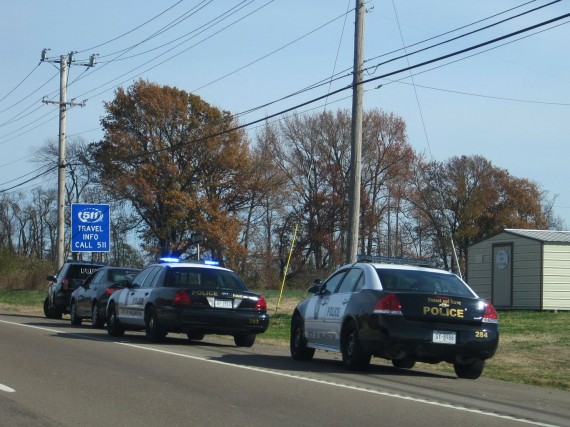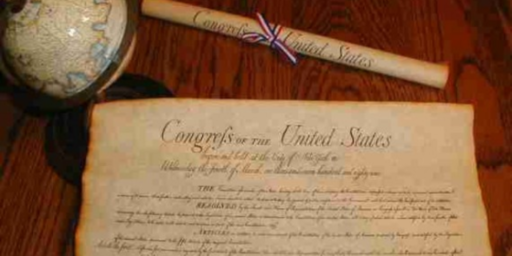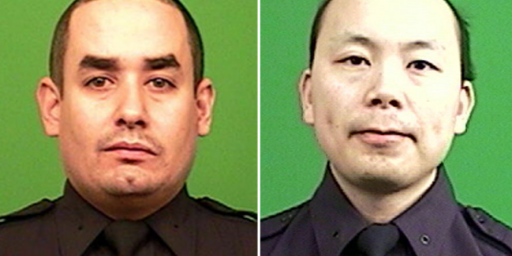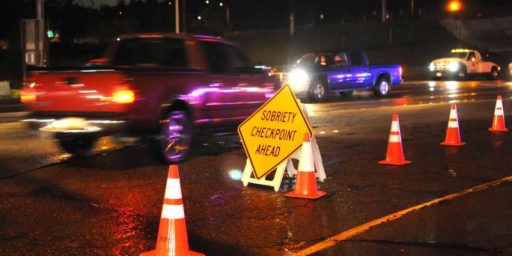Supreme Court: Police Can Make ‘Reasonable’ Mistakes Of Law In Executing A Traffic Stop
The Supreme Court says that police who have a "reasonable" misunderstanding of the law can still pull you over.
In a decision handed down yesterday, the Supreme Court ruled that a police officer who pulls over a vehicle based on his or her mistaken understanding of the law can still be said to have acted in accordance with the Fourth Amendment if the facts indicated that the mistake was “reasonable” under the circumstances:
WASHINGTON — A police officer can stop a car based on a mistaken understanding of the law without violating the Fourth Amendment, the Supreme Court ruled on Monday in an 8-1 decision.
The case arose from a traffic stop in North Carolina based on a broken brake light. But state law there required only a single working “stop lamp,” which the car in question had.
In an opinion by Chief Justice John G. Roberts Jr., the Supreme Court ruled that the officer’s mistake was reasonable and so did not run afoul of the Fourth Amendment’s ban on unreasonable searches and seizures.
The case concerned a 2009 traffic stop near Dobson, N.C., conducted by Sgt. Matt Darisse. The car’s owner, Nicholas B. Heien, who had been asleep in the back seat while a friend drove, consented to a search. Sergeant Darisse found a sandwich bag containing cocaine.
Mr. Heien was charged with attempted drug trafficking, and he challenged the stop as a violation of the Fourth Amendment. A midlevel state appeals court agreed, basing its decision on an interpretation of the state traffic law as requiring only a single working brake light. The interpretation was not challenged as the case was further appealed. The North Carolina Supreme Court nonetheless reversed the decision, saying Sergeant Darisse’s mistake about what the law meant had been reasonable.
In Monday’s decision, Heien v. North Carolina, No. 13-604, the United States Supreme Court agreed. Chief Justice Roberts noted that searches and seizures based on a police officer’s reasonable misunderstanding of the facts had long been permissible. He said that reasoning applied to mistaken interpretations of the law.
Chief Justice Roberts wrote that the court’s decision “does not discourage officers from learning the law,” because only objectively reasonable mistakes were permitted.
“An officer can gain no Fourth Amendment advantage,” the chief justice wrote, “through a sloppy study of the laws he is duty-bound to enforce.”
Justice Elena Kagan joined the majority opinion but added a concurrence, which was joined by Justice Ruth Bader Ginsburg. She emphasized that the state law in question “poses a quite difficult question of interpretation, and Sergeant Darisse’s judgment, although overturned, had much to recommend it.”
Justice Sonia Sotomayor dissented. She said the court’s ruling “means further eroding the Fourth Amendment’s protection of civil liberties in a context where that protection has already been worn down.”
The majority’s approach will also, she said, contribute to distrust between citizens and the police. If police officers are given leeway to interpret the law, she wrote, “one wonders how a citizen seeking to be law-abiding and to structure his or her behavior to avoid these invasive, frightening and humiliating encounters could do so.”
Rory Little parses the opinion for SCOTUSBlog:
The exercise of police discretion to stop people on the street is front and center in today’s headlines. In this case, a North Carolina policeman stopped Heien’s car because it had a brake light that did not work. During the stop, Heien consented to a search of the car, which yielded cocaine in a duffle bag and Heien’s ultimate conviction for attempted drug trafficking. On appeal, the North Carolina appellate courts surprisingly ruled that the outdated state vehicle code required only one working brake light (“a” stop lamp, in the words of the statute); therefore, there had been no violation of law that would permit the stop. The officer made no error about the facts; but he had been mistaken about the meaning of the law. However, the North Carolina Supreme Court ruled, the officer’s mistake about this law was “reasonable,” and for that reason the Fourth Amendment right to be secure from “unreasonable … seizures” was not violated. This morning’s opinion in Heien v. North Carolina affirms that holding.
(…)
Over the years the Court has honed its thinking about what constitutes “probable cause” to stop or search (for example, Illinois v. Gates in 1983), and in Terry v. Ohio in 1968 the Court famously ruled that even brief stops on the street require at least specific and articulable “reasonable suspicion,” not just hunches. The Court has subsequently made clear that even when police are mistaken about facts, their stops do not violate the Constitution if their mistakes are “reasonable.”
Today, in an opinion by Chief Justice John Roberts, a majority of eight Justices affirmed that “there is no reason … why this same result” should not apply “when reached by way of a similarly reasonable mistake of law.” The Court conceded – and Justice Sonia Sotomayor, the lone dissenter, agreed – that no precedent of the Court has expressly answered this “reasonable mistake of law” question (“scarcely a peep”). The Court noted, however, that as early as 1809, the Supreme Court ruled that a reasonable mistake of law about probable cause permitted a customs seizure under a federal statute. By 1860, this general principle had been adopted in “numerous [lower court] cases.” While acknowledging that the statutory customs cases were “not directly on point” for the constitutional question, the Court also explained that “no decision of this Court in the two centuries since has undermined that understanding” that reasonable mistakes of law can excuse governmental action. In fact, the Court explained that in more recent cases, such as Michigan v. DeFillippo, it had found no Fourth Amendment violation even when governmental searches were based on state statutes later declared unconstitutional. (Justice Sotomayor strongly disagreed with this reading.)
(…)
Importantly, particularly in light of recent controversies, the Court observed that the standard of reasonableness for mistakes of law is “not as forgiving” as some might have it. An officer’s legal error must be objectively reasonable, and not based on a particular officer’s “subjective understanding” or on a “sloppy study of the laws he is duty-bound to enforce.” Thus, the Court suggested, an officer must “learn[] the law,” and I would expect that the familiar standard of a “reasonably well-trained officer” will be rigorously applied by lower courts when confronted with Heien errors in the future.
In a separate concurrence, while joining the majority opinion “in full,” Justice Kagan (joined by Justice Ruth Bader Ginsburg) emphasized these “important limitations.” Only a “genuinely ambiguous” statute should support a “reasonable” mistake about its meaning, one that would present judicial officers with “interpretive work” that is “really difficult” or “very hard.”
In a solo dissent, Justice Sotomayor argued, not unreasonably, that a “fixed legal yardstick” would be easier to administer than a floating standard of “reasonable” legal mistakes. “The actual state of the law” should control, rather than a “reasonable misunderstanding about the law.” Law enforcement would not be penalized if Fourth Amendment violations were found based on such legal misunderstandings, because “good faith” would prohibit the exclusion of evidence and “qualified immunity” would protect officers. Meanwhile, definite and clear interpretations of laws would be encouraged, rather than elided.
With only slightly veiled references to current controversies involving police confrontations on the street, Justice Sotomayor contended that the Court’s less definite ruling would lead to “further eroding [of] the Fourth Amendment’s protection of civil liberties … where that protection has already been worn down.” Police stops based on reasonable suspicion are “invasive, frightening, and humiliating,” and Justice Sotomayor submitted that today’s ruling “significantly expands this authority.” There are “human consequences … including those for communities and for their relationships with the police.” The majority’s rule, she continued, “will prove murky in application” and difficult for police and courts to administer. Of course, only time will tell whether today’s “reasonable mistake of law” holding will be “narrowly circumscribed,” as both the concurrence and dissent insist it should be.
On some level, the Court’s ruling here is not entirely surprising. Previous court decisions have given some degree of wiggle room when it comes to how they behave out in the field. The very standard of reasonableness itself, which has been applied to police action for some time now, means that a police action based on what turn out to be mistaken facts will often be seen to be within the bounds of the Fourth Amendment even when it turns out that what the officer was relying upon when they acted was not entirely accurate. A robbery or other crime followed by a mistaken description of a wanted vehicle or individual, for example, that is broadcast to an officer who then pulls someone over in good faith and discovers evidence of a completely different crime will generally not result in evidence being thrown out based on the exclusionary rule as long as the mistake of fact is reasonable. Obviously, what is “reasonable” is something that varies on a case-by-case basis and would be something that the trier of fact, typically a judge in a suppression hearing but ultimately a jury if a case goes to trial, would have to determine. Some mistakes, such as pulling over a brown car when the description given was for a completely different color car, for example, would be easy decisions while others may not be. The purpose of the reasonableness rule in these situations, obviously, is to recognize the fact that, often, police are operating on limited pieces of information and that the Fourth Amendment should not be read so strictly as to bar the introduction of relevant incriminating evidence simply because an officer was mistaken about some fact, or that they received information that was mistakenly communicated incorrectly.
The mistake here, of course, is of a completely different type. Rather than being a mistake of fact such as a mistaken description of a missing vehicle or individual, we are dealing here with an officers mistaken, indeed, incorrect interpretation of the law. In theory at least, a police officer is supposed to have at least a basic knowledge of the laws that they are enforcing, and it is the responsibility of their departments and their supervisors to keep them apprised of changes in those laws as necessary. A decision such as this, which says that an officer can base a traffic stop, or presumably a stop of someone who is just walking down the street, on an understanding of the law that is incorrect can still be valid as long as the officer reasonably believes that it is correct strikes me as something that, while it seems reasonable on its face, has the potential to open Pandora’s Box even further and give police even wider discretion in deciding who they will pull over or subject to more intensive searches. It also, arguably, gives officers, their supervisors, and the agencies responsible for keeping them trained an incentive to be, shall we say lax in keeping officers up to date on the state of the law when there are changes that could potentially restrict an officer’s ability to act. Notwithstanding the Court’s admonition that its ruling means that an officer’s mistake must be “objectively” reasonable to pass Constitutional muster, it seems exceedingly clear that any standard that depends on reasonableness is going to allow abuse like this. Finally, it’s worth noting that there is a big difference between mistakes of fact that the Court has dealt with in the past to a mistake regarding the law like the one at issue in this case. As noted, police are presumed to be aware of the bases upon which they can validly pull someone over, or search them. Allowing them to claim a “mistake” about the law has the potential to turn Fourth Amendment protections into something of a joke. We are already seeing evidence on our streets and in the media of the extent to which public distrust of the police has become a real issue that transcends racial and economic barriers. As Justice Sotomayor notes in her defense, a decision like this has the potential to only enhance that trust, and that’s not good for anyone.
Here’s the opinion:







“My understanding of the law banning death-inducing chokeholds was hazy.”
And yet ignorance of the law is still no excuse when breaking it….
That’s some catch, that Catch-22.
Oh, my bad. I thought the use of deadly force was authorized for routine traffic violations.
The answer to “Can I search your vehicle?” is always, an unequivocal, no.
@Rafer Janders:
Correct. We are expected to know all the laws, but officers are not expected to know anything more than what they are force-fed at the academy–if that.
“Yes your honor, mustard gas is much more efficient in crowd control then pepper spray”
Why doesn’t the Supreme Court just say,
“Cops, you can do whatever the heck you want to do, and we’ll figure a way to justify it later.”
That’ll save a heckuvalot of future litigation…
@Jack:
“Oh, I thought exigent circumstances allowed me to search the vehicle, even in the face of an equivocal no.Guess I misinterpreted what “exigent circumstances” were. And gee, I’m sorry I shot the driver for resisting arrest.I thought the law permitted that.”
Better video it
Video: In expletive-laced encounter, officer allegedly slaps man
@stonetools: Unfortunately, I can see an officer using that very excuse.
@Paul L.: I have a dash cam that points down the road and at both the driver and passenger side windows.
@Paul L.: Also, I don’t roll my windows down far enough for an officer to reach into my vehicle.
This cop is a hypocrite and a pr1ck.
@Jack:
Paul L is of the “Police can and should be able to do whatever they want, whenever they want, including killing innocent people, because police.”
Or at least that’s the summation of his comments from the last month.
I think you meant “enhance that distrust”.
This seems beyond unreasonable. It’s dumb. It’s as dumb as Roberts claiming that the only corruption possible is the direct exchange of money.
So what if Mr. Heien had said, “no, you cannot search my car”.
What then? That car was getting searched no matter what. Now cops have carte blanche to do whatever they want. The 4th was just wiped off the page. Just as Bush and Cheney were famous for claiming they “…did not remember…” when being deposed, every cop will now say they were mistaken. “…Oops…my bad. You’re still going to jail…”
I suspect there is something bad with the water in the SCOTUS building.
@Neil Hudelson:
I was mocking/concern trolling public sector police union officials who will defend any and all actions done by police officers,
Like
Cleveland Police Union Head to MSNBC: Tamir Rice Shooting Was ‘Justified’
Or Jeff Roorda or Pat Lynch.
Is this where we comment on the decision?
The state law apparently requires that “all originally equipped rear lamps” be “in good working order,” so this is a situation where the law appears to require both lights to be functioning, but another provision merely referencing “a stop lamp” was interpreted to mean only one rear lamp be in good working order.
My impression is that the U.S. Supreme Court thought that the North Carolina courts had misinterpreted North Carolina law. The law enforcement officer was reasonably mistaken because the state courts charged with interpreting state law were unreasonably wrong.
Jeffery Follmer, head of the Cleveland Police Patrolman Union commenting on the Tamir Rice shooting.
One small step for a cop, one giant leap towards fascism…
Just last week my brother was pulled over for “matching a description”. My brother responded, “The description was for a bearded, white male driving a red Durango towing a blue Firebird?” The cop let him go without answering.
In my experience, police are full of it, even the “good” ones. I worked security for a university. We worked with the police, even did some training with them. Knew all the cops on my shift by name. Then one night I had my patrol vehicle stolen (yes it was running). It was found a few blocks away in an apartment parking lot.
A week later I get called in to the department, no big deal, I know everyone there, I know the guy who called me. I get there and I’m blindsided with accusations that I’d faked the theft to cover up damage that was found on the vehicle when it was recovered, they had witnesses, the whole nine yards. After I got out of there I went to my boss who had been a lieutenant with the Chicago police department and she told me never to talk to the police.
Funny part is it came out later that the damage (which was very minor) had been caused by the previous shift and hadn’t been reported,so they got to find out they’d accused me for nothing and destroyed our working relationship on a wild hunch. Despite being Lead Supervisor I couldn’t work with them after that (never received so much as a sorry) and I quit shortly after.
Tl;Dr The police are not your friends and they don’t make innocent mistakes.
@James: Yes so many times.
A few years ago I got pulled for having two brake lamps out. The police officer and I figured out real quick it was a fuse. He held a flashlight while I put in a new fuse and I was on my way, no ticket needed.
That guy in this case made two mistakes: giving the police a go ahead to search. And having that stuff in his car to start with. I would say that sooner or later (emphasis on sooner) in some places you will get arrested if you have a soft drink or donuts in your car ! “Punishable by $500 fine or two years in jail”
“Red flashing lights around me …..This is the police you are surrounded …give yourself up !”
R. Dean Taylor, “Indiana Wants Me”
“I fought the law, but the law won!” Bobby Fuller
@PD Shaw:
You may be right…but the decision still renders the 4th meaningless.
@PD Shaw:
I get what you mean, but this was not a narrow decision.
Yes, when applied to the facts of this case, the Court said it was a reasonable mistake by the officer because N.C. courts misinterpreted the law.
However, in order to get there, Roberts (and all but Sotomayor) put another nail in the 4th Am. coffin.
@Tyrell: I went from very friendly and respectful to outright fearful of some police encounters.
I’ve had my car searched many times for various reasons. The simple go to is “I thought I smelled some marijuana”. At that point protesting is a losing proposition as they can bring a dog to get a hit so then they can then move on to the search. Should a dog not be available then you will wait. and wait… wait some more. I’ve had my car searched many times over my life. Mostly by far when I was under 24.
On the other hand I’ve had some officers act incredibly professional even when they really REALLY wanted to give me a ticket. I was pulled over for my inspection sticker being out of date. The place had reversed the number locations on accident. Fortunately I had kept the receipt from the inspection (next to my insurance info). So I gave that to the officer and pleaded my case. The officer was an older stern looking fellow who just didn’t seem convinced I wasn’t lying. After sitting in his car for some time doing whatever I was let free and that’s when he admitted he had really wanted to give me a ticket. I thanked him for his fairness and went on my way.
One officer actually kind of saved my life in an indirect way by causing some self reflection on my alcohol intake.
I’m a white guy BTW..
Just funny cops can make “mistakes” or misinterpret the law, n this will stand. However there mistakes lead others lives Ito disaster n this is ok? Wow the United States is corrupt!
I think these cops that don’t know the law are just demonstrating the New Professionalism that Scalia mentioned.